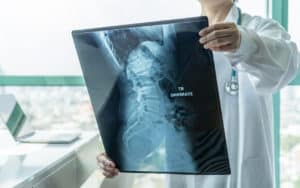Back Injury

Back injuries are the most common cause of missed workdays. They also form the basis of more workers’ compensation claims than any other injury.
A back injury can range from a minor muscle strain to a damaged disc that pinches the spinal cord. Your back is so essential to standing, walking, and sitting that you might lose the ability to do any of these without pain when you have an injured back.
Below, you will learn about the causes and effects of a back injury. You will also learn about the compensation you can seek for your back injury.
Table of Contents
What is the Structure of Your Back?

Your back is composed of many different bones, ligaments, muscles, and more. An injury to any of these can cause pain and reduced mobility.
Your back provides strength and flexibility for your body. Your spine runs up the center of your back. Your spine includes about 24 vertebrae.
Each vertebra has a solid body and wing-shaped processes. The bodies align to form a column running up your back. Ligaments attach to the processes to hold the vertebrae together. Tendons from your back muscles also anchor to the processes.
A disc sits between each pair of vertebrae. The disc cushions the vertebrae as you walk, run, or jump. They also provide a smooth surface when you bend or twist your back, so your vertebrae do not grind against each other.
Your back also includes your ribs. You have 24 ribs that attach to your spine through ligaments. These ribs protect the chest cavity, where your heart and lungs sit.
Muscles sit between the ribs. These intercostal muscles expand and contract your ribcage to help you breathe.
Your back also has several large muscle groups that give it the strength to carry your body weight. They also help you lift, carry, bend, and twist.
What Are Some Causes of a Back Injury?
Back injuries can happen in almost any accident. The mechanisms that cause most back injuries include:
Blunt Force Trauma
When an object strikes your back without penetrating the skin, you experience blunt force trauma. An example of blunt force trauma would include a pedestrian accident where an SUV struck your back.
Penetrating Trauma
When something pierces your back, you suffer penetrating trauma. If you fall at a construction site onto a piece of rebar that penetrates your back, you suffer penetrating trauma.
The dangers of penetrating trauma include:
- The object could penetrate your chest cavity and damage your heart or lungs
- The object could pierce the spinal canal and sever the spinal cord
- You could develop an infection from the open wound
Penetrating trauma can also cause bleeding, leading to blood loss and shock.
Hyperextension
Hyperextension happens when your back gets stretched beyond the capacity of your muscles, tendons, or ligaments. The overstretching damages and tears the fibers of these structures.
A common cause of hyperextension back injuries is car accidents. In a car accident, the collision can stretch your spine.
Overuse
When you stress your back, you develop small cracks in your discs, vertebrae, muscles, tendons, and ligaments. If you rest afterward, your body heals these cracks. But if you repeat the same motions repeatedly, the cracks propagate and worsen.
Those most at risk for overuse injuries include those with jobs where they perform repetitive motions for several hours every day. Walking, lifting, and carrying can stress the back and cause overuse back injuries.
What Are Some Back Injury Examples?
Back injuries can take many different forms with different treatments and different prognoses. Some examples include:
Back Strain or Sprain
Back strain occurs when the tendons or muscles in your back get stretched or torn.
The stretched or torn tissue inflames and produces symptoms such as:
- Pain
- Swelling
- Weakness
- Stiffness
- Muscle spasms
Back sprains happen when the ligaments holding your vertebrae together get stretched or torn. They can also happen when the ligaments holding your ribs to your vertebrae stretch or tear.
Symptoms of a sprained back include:
- Pain
- Swelling
- Popping sound or sensation at the time of injury
- Stiffness
- Bruises
- Back instability
Back strains and sprains usually heal without surgery. Over four to six weeks, you will see your symptoms dissipate, particularly if you can rest and ice the injury.
Dislocated Rib
If you sprain the ligament holding the ribs to the spine, your rib can dislocate. The dislocation can produce pain as the dislocated rib irritates nearby nerves. The primary symptom of a dislocated rib is pain that worsens when you inhale or exhale.
Disc Damage
Stress on your back can compress and damage your discs. A herniated disc happens when disc compression causes the inner part of the disc to protrude through the tougher exterior.
A bulging disc happens when the exterior weakens but does not separate. As a result, the disc deforms into a barrel shape rather than a cylinder shape.
In either case, the disc can push on the spinal cord.
The nerves of the spinal cord will inflame and misfire, causing:
- Pain that radiates into your arms or legs
- Numbness or tingling
- Weakness
- Loss of dexterity
Doctors can sometimes repair your spine by removing the damaged disc and either replacing it with an artificial disc or fusing the adjacent vertebrae.
Fractured Vertebra
A fractured vertebra poses a severe risk of spinal cord damage. Bone fragments can slip into the spinal canal and sever the spinal cord. This damage can result in permanent paralysis. As a result, doctors will be very careful to stabilize your back and prescribe bed rest until your spine heals.
How Do You Get Compensation for a Back Injury?
You might be entitled to compensation for your back injury if it resulted from a preventable accident. Specifically, if your back injury was caused by someone else’s intentional or negligent actions, you can get compensation for your economic and non-economic losses.
Back injuries can interfere with your ability to work, take care of your daily needs, and even participate in the activities you enjoy. You might need substantial time to recover from a back injury. You may even suffer permanent disabilities due to your back injury.
Contact the M&Y Personal Injury Lawyers for a free consultation to discuss the compensation you can seek for your back injury.
